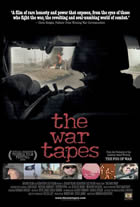The War Tapes

Last night my family headed to the Maui Film Festival to watch The War Tapes (trailer). I left the screening with a deep insecurity about governments, motives, and the human cost. The War Tapes is a documentary shot by three soilders: Seargent Steve Pink, Specialist Mike Moriarity, and Seargent Zack Bazzi. It is raw footage: you see bits and pieces of bodies torn apart by IEDs, how insecure the roads are, you feel the fear of the soilders . . . It is hard to watch this film and ever glorify war. Even the most gung-ho soilder, Mike Moriarity, struggles with understanding why he has given a year of his life to this war, which he fully supported (and says he still supports Bush and the war).
Majikthise has already written a fine review of The War Tapes here. So, I will say a few words about what haunted me the most about The War Tapes. You get to see the men after they return from their year in Iraq, and each of them struggles with PTSD, reintegrating into civilian life, and how this affects their work, familial relationships and romantic ones. Seargent Pink, we are told, does not treat his PTSD and he might still be called up to go back. His girlfriend struggles with how to talk to him and watches him tortured at night. While Bazzi is by far the most critical of the war, Pink's diaries and commentaries are the ones that illustrate to me the ignored cost of war.
Pink describes, at one point, how his fellow soilders began arguing over what kind of meat a severed limb most resembled: pot roast or hamburger. Human intestines are definitely sausages. As he writes these descriptions, he is fully aware that this way of rendering human bodies in order to cope with the violence will continue to haunt him. At the end of the film, he describes how he felt when he finally got to participate in killing some insurgents. He takes photos of all the corpses, photos which we get to see, but only while he tells us how his superior was critical of him for taking them. Pink points out that he wasn't trained to see these men as anything more than objects, to dehumanize them, to hate them. That is how he is able to kill. He also describes how a dog started eating the flesh from one of the bodies, and rather than shoo the dog away, he cheered him on: "fill your belly."
That scene is haunting, particularly because Pink is so articulate, thoughtful and fully aware how screwed up this is making him.
The war never ends for these men. Furthermore, not one of them easily justifies to himself why they are fighting. Moriarity, who signed up to fight in Iraq after 9-11, admits many times that they are protecting KBR/Halliburton, and Sgt. Pink points out that if this war is for money, then someone besides Dick Cheney better be getting some.
Bazzi is an Arab-American, originally from Lebanon, and we first learn that he is an avid Nation reader. Bazzi often talks to young kids in Arabic, and tells us that other soilders asked him to translate their orders to the Iraqi civilians. At one point, a supervisor tells Bazzi to insist that a man with a very sick boy not cross the road to the hospital, and Bazzi explains that he just stopped translating; he saw no tactical sense and he wasn't going to be the messenger.
One last observation. At least twice in the film a woman or a young girl becomes the only kind of Iraqi capable of challenging these mens' dehumanization of all Iraqis. They never know who is the enemy, every car that they pass, every civilian on the road, can be an insurgent. And, so they become aggressive when they find a car pulling in front of them or a man walking on the street in front of their Humvees. But, when they see a woman in the car, or when they hit a young girl holding cookies (whose body lays in pieces), suddenly the Iraqis become human again and the inhumanity of this war floods them.
When The War Tapes is released, I hope that every American, especially those who supported or continue to support this war goes to see it.

|